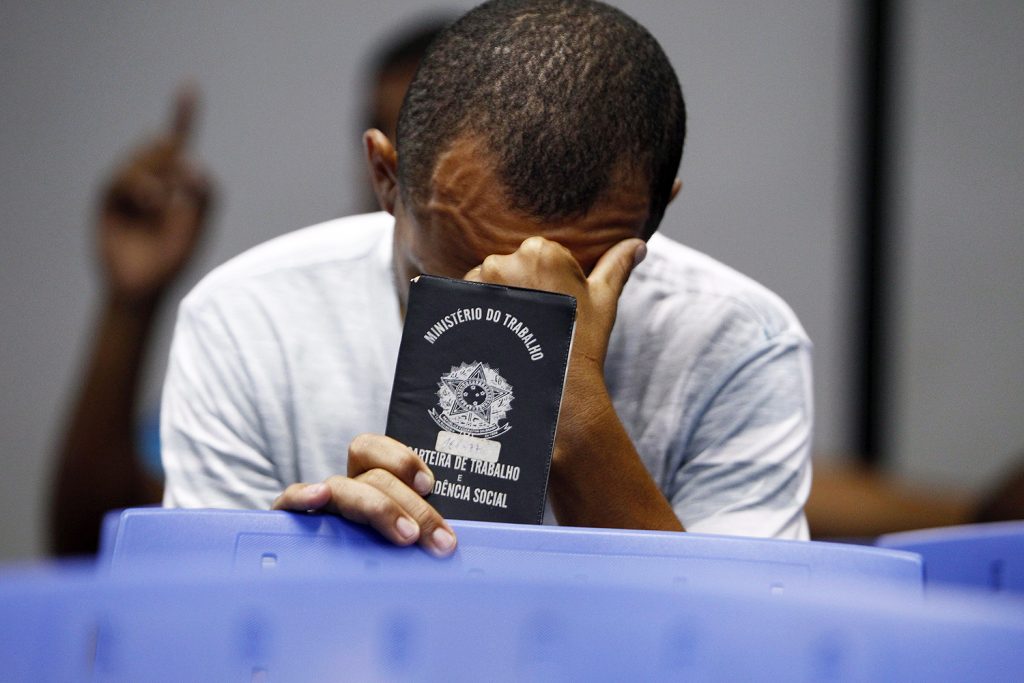RIO DE JANEIRO, BRAZIL – The coronavirus crisis will leave up to 12.6 million unemployed and will cause a record contraction of almost 15 percent in workers’ income unless the government expands the income transfer programs to the population and helps companies to retain jobs.

The figures are part of a study by researchers from Ibre/FGV (Brazilian Institute of Economics of the Getulio Vargas Foundation) Silvia Matos, Luana Miranda, Livio Ribeiro, Vilma Pinto, Paulo Peruchetti and Tiago Martins.
Despite the measures already announced to ensure extra income to formal and casual workers, which total R$170 billion (US$34 billion), the wage bill is expected to drop 5.2 percent, a record decline in the series begun in 2003. Without these measures, the drop would have been 10.3 percent.
In the scenario considered most feasible by researchers, there is a 3.4 percent retraction in GDP (Gross Domestic Product) and 6.7 percent in hours worked and in the occupied population – with the loss of approximately six million jobs. Unemployment would end the year at a record 17.8 percent.
In the quarter ended in February 2020, before the crisis began, this rate stood at 11.6 percent. The most pessimistic scenario maintains expectations for most sectors, but signals a deeper deterioration in the services sector.
In this case, wage expenses drop 13.8 percent, despite measures already announced by the government, with a 13.5 percent reduction in the occupied population and hours worked in all sectors, a figure compatible with a seven percent contraction in GDP. The unemployment rate would reach 23.8 percent – there would be a further 12.6 million unemployed in the country.
In both scenarios, the decline of the occupied population is a record for the series prepared with data from 1982 onwards. The worst past results were the retractions of around two percent in 1990 and 2016.
According to researcher Silvia Matos, the 3.4 percent drop in GDP in 2015 and 2016 is virtually the same as in 2019-20, but job cuts in Brazil and other countries will not be comparable to any other recession of the past 40 years.
“There is a gap between GDP and employment as we have never seen. I am less concerned about GDP and more concerned about income. The employment shock cannot be avoided. We’ve seen it in other countries. The issue is to provide income relief to mitigate this severe shock.”
“We’ve already experienced similar GDP drops, but the income loss will be much greater. You’re going to have to offset that, because people are not going to be able to find jobs,” she says.
The researcher says the employed population in the service sector has grown virtually every year since 1995, except in 2016, when it was stable, because informality helped offset the loss of formal jobs in other crises. This time, however, casual work tends to suffer more than formal work.
“In the recent recessive period, informality increased, there was an escape valve to ensure employment. At this time, the nature of the shock does not allow for this. There is not much to be done to preserve those jobs. You have to preserve the income.”
The list of measures announced by the government in this regard, used by researchers to estimate how much this will minimize the impact on income, are financial aid for casual workers (coronavoucher), the extension of the ‘Bolsa Família’ (Family Grant), the anti-unemployment program (proportional reduction of wages and working hours) and transfers from the PIS/Pasep (social contributions payable by companies to finance the funds for insurance for unemployment, child benefit and allowance for low paid workers) to the FGTS (Severance Indemnity Fund).

In the analysis of the impact, other measures were included, such as the advance payments of the 13th salary by the INSS (National Institute for Social Security) and the salary bonus, of almost R$ 60 billion. According to researcher Vilma Pinto, the R$600 aid for casual workers is lower than the average income of workers without a worker’s record book, of R$1,464 according to IBGE (Brazilian Institute of Geography and Statistics) data. In the case of formal workers, the anti-unemployment program provides compensation up to the amount of unemployment insurance, which does not reach R$2,000, below the average of wages with a worker’s record book (R$2,881).
“The compensation is partial, for both formal and casual workers. So there’s this drop in the cost of wages,” she says. The calculation considers the government number for the program to fight unemployment of formal workers, but there is no guarantee that the companies will adhere, nor that they will be able to survive long enough to overcome the crisis.
Silvia Matos says it is not feasible to currently estimate the amount needed to ensure income stability, which will depend on the length of the crisis and the profile of the most affected workers. She also says it is important for the government to signal that there will be sufficient resources to ensure the survival of companies and employees.
“This [clarity] won’t happen again until we have a vaccine. The crossing can be long. It’s important to have heavy artillery at this first moment,” she says. “Entrepreneurs may decide to close their businesses if they don’t have guarantees. The only one capable of giving the slightest assurance is the government. Then we think about the inspector. We’re going to go through this crossing with as little inequality as possible. Trying to lessen the impact on family income. This is what’s possible.”
According to Ibre’s researchers, there are no data from other countries that show a rapid rebound in the economy after isolation has been relaxed. And even those who have not adopted quarantine are recording a sharp drop in activity.
According to Livio Ribeiro, data from countries affected earlier than Brazil by the pandemic show that the service sector has suffered more than industry. China, the epicenter of the disease and the first country to relax quarantine, has not recovered at the same pace.
“In the case of services, rebound tends to be slower. And the labor market suffers very intensely and very quickly, something that we have not seen in the history of any country of this magnitude and speed until today.” Ibre’s work considers that Brazil will experience, as of April, a shock similar to that seen in China in the labor market. As a result, the unemployment rate will reach 16.1 percent in the second quarter, with a loss of 4.4 million jobs.
In addition to the behavior of indicators in other countries, Ibre’s new index on financial conditions and the institution’s special survey with companies on the impact of Covid-19 were used in the study, variables that helped to shape the GDP projection model. The survey was carried out in a period in which part of the activities were still operating (March 1st to 25th) and about half of the service companies considered that they would be affected by the crisis.
Therefore, the researchers also traced the pessimistic scenario (GDP of -7 percent) maintaining the numbers for all sectors and raising the fall in the value of added services in the GDP from -2.4 percent to -6.9 percent, with a retraction in the employed population in the sector from -6 to -15.6 percent.
“If the survey were conducted today, the result for services would most likely be much worse. So we kept the industry constant and worsened the drop in hours worked in the sector,” says researcher Luana Miranda.
Ibre’s most pessimistic projection is not far from that released by several financial institutions, such as Santander and Itaú Unibanco, banks working with scenarios that project at least a six percent drop in Brazil’s GDP.
Last week, when Ibre’s study had already been completed, the World Labor Organization announced that the number of hours that will cease to be worked in the world due to the coronavirus, in the second quarter of 2020 alone, represents a 6.7 percent drop in the workload. The Ibre projects a 4.7 percent drop for the quarter in question in Brazil.
Source: Folhapress

